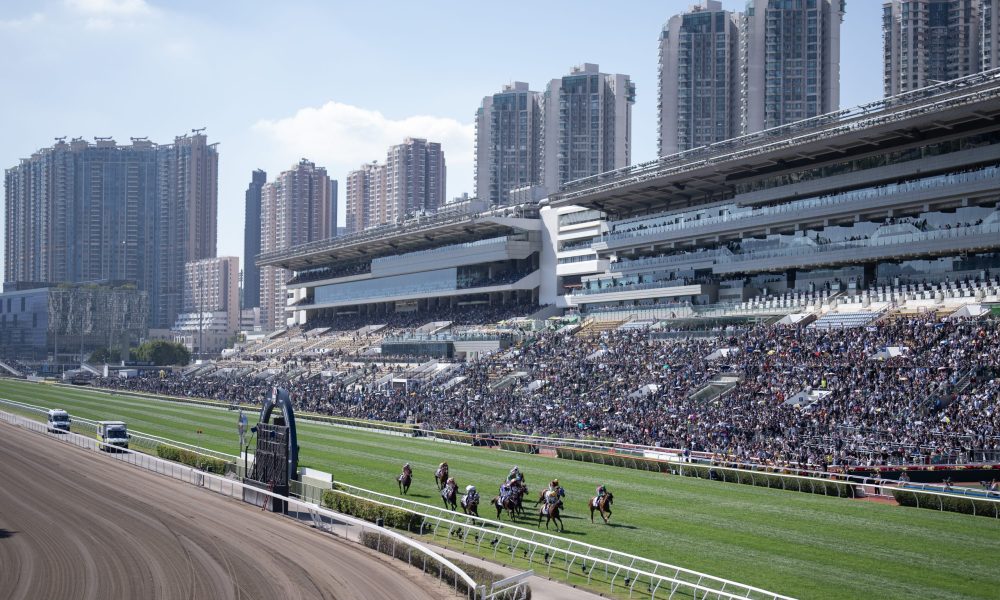‘Field sizes key to combating Hong Kong turnover decline’

Jockey Club implementing initiatives to increase horse population in Asian jurisdiction
The Hong Kong Jockey Club plans to add to the number of initiatives aimed at boosting its horse population, a move chief executive Winfried Engelbrecht-Breges believes can counteract a decline in betting turnover on racing in the Asian racing jurisdiction.
After Sunday’s 2023-24 season finale at Sha Tin, the Jockey Club reported that HK$134.7 billion (AUD$25.592 billion) had been bet on Hong Kong racing over the last year, a figure that was down 4.5 per cent on the previous season.
The decline in wagering also brought an end to the record growth of punting on Sha Tin and Happy Valley racing after three successive increases.
Engelbrecht-Breges said weakness in the local economy and smaller field sizes had contributed to the decline in turnover.
“If you look at turnover and gross margin, you have to look at field sizes because this year, we were definitely not at optimum field sizes,” Englelbrecht-Breges said.
“In my view, it contributed to the four per cent [decline in turnover]. We have a strategy to fix the horse population issue and we will see field sizes grow.
“I’m convinced we will come out of these economic challenges stronger with our long-term vision.”
Among those Jockey Club initiatives to improve the field sizes is to widen the number of owners allowed to race in Hong Kong and that includes the Jockey Club offering private purchase permits to large-scale international thoroughbred investors such as Yulong’s Zhang Yuesheng and South African billionaire Mary Slack, among others, in recent years.
Gandharvi Racing’s Kuldeep Singh Rajput, who has large racing and breeding portfolios in Australia and the United States, also features on the list of owners granted PP permits in the 2024 horse ballot, which took place in early June.
In total, 440 permits were granted by the Jockey Club this year – 100 PPs and 340 private purchased griffin permits.
Independent Australian agent Tommy Inglis, who has been buying horses for the Hong Kong market for the past seven years, said the political environment and the pandemic had adversely impacted many Hong Kong owners’ willingness to either race horses altogether or to reduce the amount they invested.
As a consequence, Inglis is in favour of the Jockey Club opening up its permits to international owners in tandem with other initiatives to make racing horses more appealing.
“The other thing [the Jockey Club] is doing is trying to decrease the costs for owners to get a horse there because it’s about $10,000 a month or similar to have a horse trained in Hong Kong,” Inglis said.
“The prize-money is phenomenal and, for lower-end racing, Hong Kong is by far the best in the world. So, a horse that could win on a Saturday in Australia, winning a $150,000 benchmark race, the owners might get $75,000 in the hand.
“But if you’ve won a trial and you win two races and then you win a Class 3 in Hong Kong, you’re looking at almost $1 million in prize-money.
“They’re also trying to make it a place where people from all over the world can come to race their horses.”
New Zealand agent Morgan Carter agrees with Inglis that the softening of the Hong Kong economy had seen permit holders’ budgets shrink for the purchase of new horses.
While the Jockey Club is implementing initiatives to increase the pool size, Carter warned against the possibility of international owners winning out over local Hong Kong owners.
“I think the Jockey Club still has to be cautious about that and not open it up to a point where your local Hong Kong permit owner can’t get a permit,” Carter said.
“I think they need to be protected first because, sooner or later, the economy will turn around and it’ll be amazing again.
“In some respects, it’d be a shame to see a whole lot of local Hong Kong permit holders nudged out of the way because overseas permit holders are getting horses through.”
Golden River Investments’ Denys Chan believes the Jockey Club needs to significantly increase its horse population to support the plan for racing at its mainland China complex, Conghua, which hosted a five-race exhibition meeting in 2019.
The Jockey Club hopes to host more regular race meetings at Conghua from April 2026.
Chan, too, suggested economic conditions in Asia – as outlined by Engelbrecht-Bresges in his public Hong Kong season summation earlier this week – had made it more difficult to procure suitable horses for Sha Tin and Happy Valley.
“Also, it is getting harder and harder to buy from Australia as prize-money has gone up Down Under,” Chan said.
Three years ago, the Jockey Club again reduced the minimum imported horse rating from 68 to 63 for PPs, providing a wider scope of equine talent available to owners, trainers and agents to potentially buy.
It’s led to, Inglis says, more trial winners and lightly raced horses ending up in Hong Kong.
“The system they’ve got now is better than it was,” the agent said.
“There are more horses going up as trial winners and they are able to go through the grades a bit better compared to a lot of those million dollar [Group-winning] horses who were thrown in the deep end and they couldn’t compete.”


